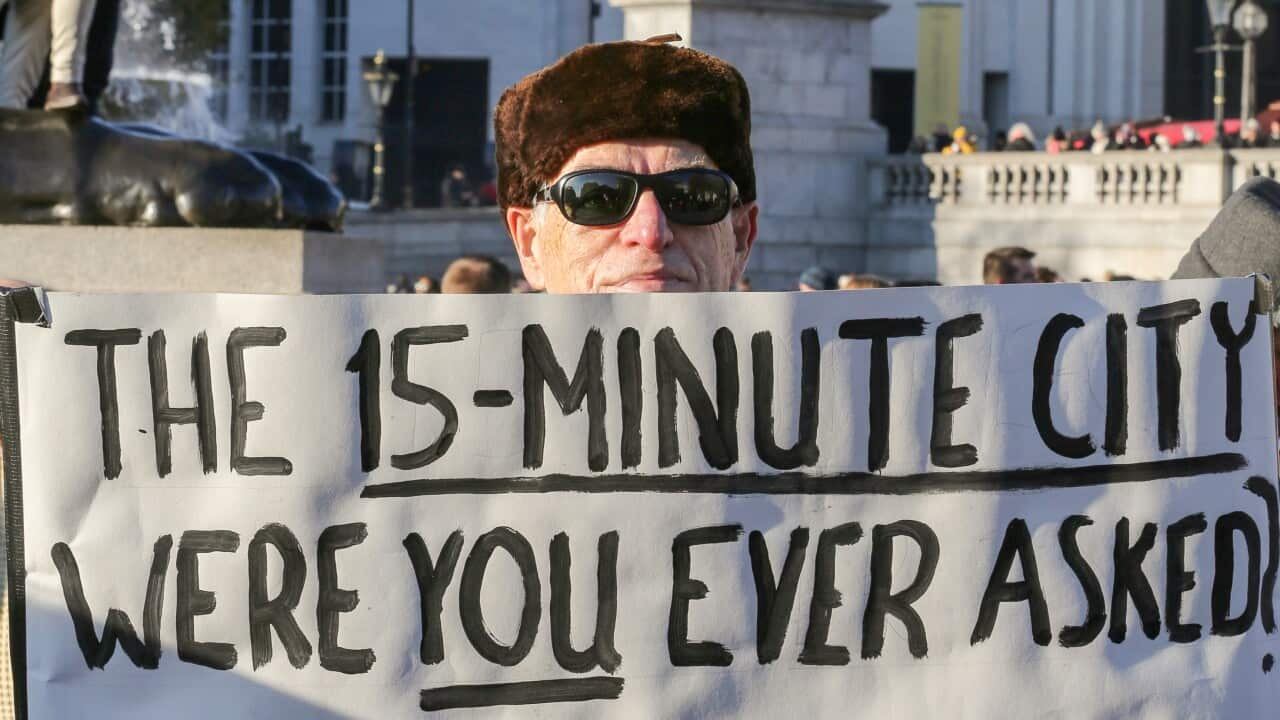Bars, restaurants, shops, parks, and your local GP all within walking distance. Sounds like a dream worth chasing, right?
Not to conspiracy theorists, who think the idea of 15-minute cities are a "dystopian hellscape", part of a grand plan to control the masses.
In the middle of it all is Duncan Enright, a local politician in the UK who works on travel and development strategies by day... and that's it.
He is not some shadowy figure or hand-picked "elite". And yet, thousands of people are convinced he’s the mastermind of an elaborate plan to trap his constituents. So much so that there are Facebook groups, paranoid videos, and protests pushing a revolt.
Mr Enright is now being hounded with messages - and even death threats - for his involvement in a proposal that was designed to improve the quality of life of people living in the city of Oxford, England.
The proposal, which is being grouped with the well-known urban planning concept known as '15-minute-cities', has since been engulfed in far-reaching conspiracies.
What's riled some people about this proposal are the driving restrictions that intend to reduce congestion. The restrictions would limit private cars from cutting through small suburban streets without a permit and give priority to buses and cyclists. If you break the restrictions, you could potentially cop a fine of up to $125.
The council plans to police the scheme through number plate recognition cameras, leading to accusations of surveillance and suggestions people will be forced to stay in their "zones".
Fears around 15-minute cities have taken hold of some people in Australia, too.
Are people in Australia buying into this conspiracy?
The City of Melbourne keeps getting letters from 'frightened people' voicing concerns.
Deputy Lord Mayor Nicholas Reece told The Feed: "Look, I laughed when I got the first one."
But now that the number is nearing a dozen, he says it's worrying this many have made the effort to write in.
Not only is the 15-minute city concept supposed to improve your quality of life with convenience and connection, it also intends to improve your health by encouraging walking and cycling, and benefit the environment by decreasing reliance on cars.
"There is nothing to fear and a lot to love about the 15-minute city," said Mr Reece.
"The wild conspiracy theory that the 15-minute city will require people to obtain a pass to leave their zone or stop them from leaving their local area is beyond ludicrous.

Protesters carry placards through the shopping mall warning of 15-minute cities and the Covid-19 vaccine. Source: Getty / SOPA Images/LightRocket
How deep does the conspiracy run?
The person who has become the poster child of the movement - literally - is a 12-year-old girl who spoke to a crowd of about two thousand protesters in the UK on 19 February.
She said the idea of "zones" - which is not what is being proposed in Oxford - would mean that kids like her would have to walk the long way home.
"They will say, 'you can walk home.' Would that safe for me to walk home? Me as a 12-year-old girl walking home alone in the dark?" she posed.
"Then they will say 'oh we've already thought of that. You will be safe. You will have a thousand cameras on the streets following you and tracking you," she added.
"No amount of cameras is going to stop someone who wants to attack me."
The young girl also mocked Greta Thunberg with an impression of the climate activist, suggesting that climate advocacy now is being used to control the masses.
On Facebook, thousands of people are connecting in location-based groups to reject the 15-minute city.
On TikTok, videos which have reached hundreds of thousands of people are imploring viewers to pull the wool away and wake up to the "dystopian hell".
Some are comparing it to the Hunger Games franchise which separated people into districts in its fictional story. Online, a few punters are so afraid of the proposal, they're calling for a general election in the UK.
Others bit back, asking believers: "Do you enjoy driving 30 mins for your groceries or an hour ambulance ride in an emergency?"
Some replied "yes".
Could the 15-minute city work in Australia?
The initial concept was designed by French-Colombian urbanist Carlos Moreno pre-2010 and was embraced by many mayors around the world during the global pandemic as a central planning pillar.
It's being encouraged by many cities including Singapore and Greater Melbourne, which strives for a 20-minute city. In 2016, Chinese cities Baoding and Guangzhou similarly called for "15-minute life circles".
And while it's nowhere near as wild as what the naysayers are spouting, there are still some criticisms of the 15-minute city.
Some international urban planners have raised concerns about their potential to fracture cities.
But University of Sydney Professor John Stanley, who has worked in transport and urban planning for almost fifty years, says it's usually not controversial.
"Melbourne's had the idea for eight or nine years but hasn't done a massive amount to implement it," he told The Feed, saying more investment needs to be made by all levels of government if they want this to be achieved.
"It's gonna take 30 years to do it, you've actually got to have a concerted effort because you have to change the shape and design of your cities to accomplish it."
In Australia for example, he says the crisis around housing affordability threatens the '15-minute city' dream.
"You're getting people moving out of the fringe because that's where the housing is the cheapest, but the reason the housing is cheapest there is it's nowhere close to jobs," he said.
Urban planner and policy analyst Professor Nicole Gurran from the University of Sydney said in Australia, where there isn't intense density and many people enjoy a backyard, a 30-minute city was more realistic.
"The idea that everything can be within a 15-minute radius really isn't very feasible here."










